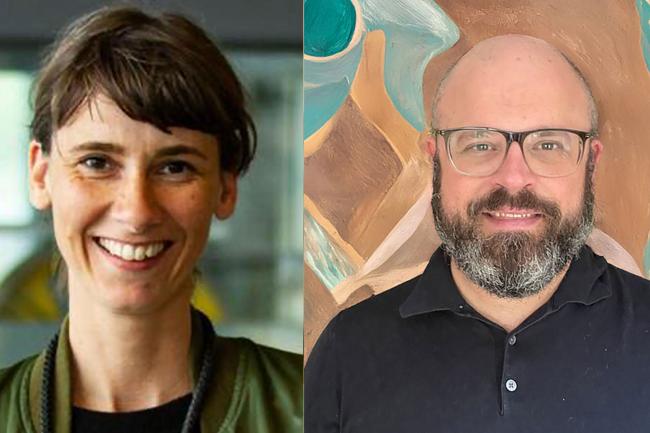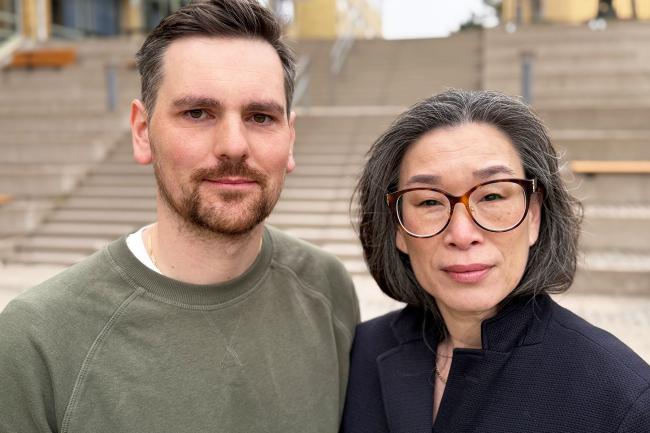Four new docents at the Faculty of Arts and Social Sciences
2025-06-02This spring, four new docents were appointed at the Faculty of Arts and Social Sciences at Karlstad University. In this article, they talk about their research, what motivates them and their visions for the future.
Andreas Henriksson, docent in sociology, what is your research about?
– My research focuses on intimacy – what it means to be close to someone, to be personal, and the effects that closeness or the absence of it can have on individuals and relationships. I have studied intimacy in various contexts, such as among older people who dance, migrant men and singlehood. I describe intimacy as an interaction that creates closeness, not just in close relationships but also in fleeting encounters, personal conversations at work or online interactions. At the moment, I’m studying “the transformative encounter” – a romantic fantasy that an unexpected meeting can change your life. It’s a notion that resonates with, for example, singles, but also plays a role in broader social visions – in urban planning, education and efforts to counteract discrimination.
What made you choose this field of research?
– It’s been a recurring interest of mine since my undergraduate studies. In my doctoral thesis on singlehood, I kept encountering patterns that I didn’t initially recognise as intimacy – but later realised the concept fit very well. I’m particularly interested in the borderlands between relationships and non-relationships. When is intimacy a sign that a relationship exists – and when is it not? How is intimacy used in our relationships today – is it a measure of how good a relationship is, as some researchers have suggested?
What are your visions for the future?
– Intimacy is relevant to many social issues, such as loneliness, belonging and identity. Loneliness is one of the major public health challenges of our time, and understanding how intimacy arises – and what it means – is important both for individual well-being and for how we design social and public spaces. It’s also about offering a more nuanced image of how closeness functions in people’s lives. One of the main challenges ahead is to broaden the use of research methods. Intimacy is often studied using qualitative methods, but I believe there is great potential in complementing these with surveys and experimental approaches. You can also find exciting opportunities in interdisciplinary collaborations, especially between sociology and psychology – where the concept of intimacy is used somewhat differently, but can be broadened through mutual dialogue.
Charlotte Bäccman, docent in psychology, what is your research about?
– My research is fundamentally about how we can create conditions for a good life, so that people can live independently and with a good quality of life regardless of the resources they have. The research focuses on two areas: digitalisation, and children and adolescents. The first part is about how digital services can support people of different ages. The second focuses specifically on children and adolescents, and what types of support they and their parents need to have a good life. In both cases, it’s about developing services, both digital and non-digital, that actually make a difference in everyday life.
What made you choose this field of research?
– My interest in digitalisation was sparked by a study conducted in collaboration with Karlstad Municipality, where we investigated how users experienced a robotic shower. The results were surprising and triggered my curiosity about how digital solutions are perceived and how they can increase users’ independence or redefine their sense of value. My interest in children and young people has always been there and is one of the main reasons for my interest in psychology. It feels meaningful to be able to bring that perspective into my current research.
What are your visions for the future?
– I hope that my research will contribute to a greater understanding of the importance of involving users and basing new digital solutions on their needs. One of the big opportunities is that digitalisation is now an integral part of society, which opens up many research possibilities. At Karlstad University, we also have a well-established network, both within academia and with private and public stakeholders in the region, which creates the conditions for collaboration, something that is crucial for this type of applied research.
At the same time, there are challenges. Measuring the effects of preventive efforts is difficult, especially without clear control groups. It is also a challenge to get people to participate in survey studies – many are tired of constantly evaluating everything from shopping experiences to health apps.
Alexandre Sukhov, docent in business administration, what is your research about?
– My research is focused on value creation, particularly in innovation management and design, as well as on advanced analytical methods. I explore how organisations can promote individuals’ creativity to solve complex problems. As an example, I have studied how ideas are developed and improved through various activities and review processes. I also develop ways to combine different data analysis methods to gain a deeper understanding of social science phenomena. One example is a study on the causes of so-called “quiet quitting”, where employees stop engaging and only do the minimum required in their jobs. Another study focuses on how public transportation can be made more accessible for older people.
What made you choose this field of research?
– I’m driven by curiosity about how we generate ideas and how we can develop more robust ways of understanding our reality. Contributing knowledge and being of value to society is a central part of being a researcher and a teacher – and learning new things along the way is both fun and rewarding.
What are your visions for the future?
– The future is to some extent shaped by our own actions. As researchers, we face challenges such as funding, collaboration and personal commitment, but by confronting them, we can build resilience and learn along the way. Opportunities are everywhere – what matters is that we take action. I hope my research can contribute new insights and models that help professionals make decisions based on research findings. In an age of information overload, it is more important than ever that we as universities and researchers stand for quality-assured and credible knowledge.
Wibke Straube, docent in gender studies, what is your research about?
– My research focuses on how nature and the concept of pollution are portrayed in art and film, often from a trans and queer perspective. Environmental and LGBTQ issues permeate my work, especially in relation to environmental discourses and notions of “purity” or “naturalness”. My recent papers explore artistic works that depict chemical pollution from queer and trans perspectives – something that is deeply rooted in cultural studies. More recently, I have also worked from a sociological perspective, using empirical methods to examine access to trans healthcare and support services in Värmland. Together with my colleagues, I have, for example, conducted a study on the Gender Identity Team Värmland – a unique counselling centre for trans people.
What made you choose this field of research?
– I want to understand how society creates marginalisation and contribute to increased knowledge about the living conditions of trans people. My hope is that research can lead to concrete changes in society, improved access to healthcare for trans people and increased psychosocial support for those who have experienced violence and minority stress. Ecological and social sustainability issues are two central, interconnected perspectives in my research and play an important role in the efforts toward a more equal and inclusive society.
What are your visions for the future?
– At the moment, we are seeing political tendencies both in Sweden and internationally that undermine gender equality and LGBTQ perspectives. Trans issues and intersectional perspectives are sometimes dismissed as “woke”, which can affect research funding and the ability to conduct inclusive research. I see this as a major challenge. At the same time, I have great faith in democracy and academic freedom. It is more important than ever that we continue conducting research that highlights marginalised perspectives and contributes to equality, social change and sustainable societal development.




